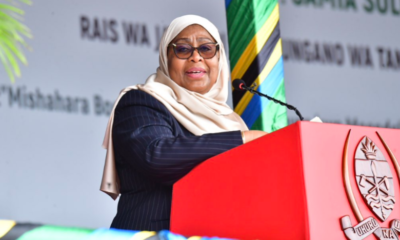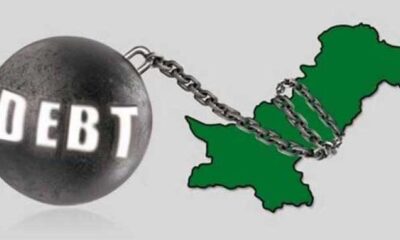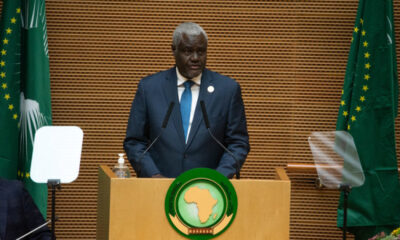Strictly Personal
Chrisland, parenting and our new society by Reuben Abati
Published
2 years agoon
The Lagos State government, following reports of an alleged “rape incident” involving an 11-year old female student of Chrisland Schools Lagos, and male pupils of the school, during a trip to the World School Games in Dubai (March 10 -13), promptly shut down the school, to investigate exactly what happened. A video was put into circulation showing the girl in a sex position, with one of the students watching and recording the bedroom scene. The public was shocked. Raw sex in a primary school, photographed and videoed and put into circulation! Matters got worse when the mother of the girl involved raised an alarm and made statements to the effect that the school, Chrisland, had failed in its duty to take care of her daughter while on a trip to Dubai, under its auspices; that on the return of the students, her daughter was taken for a pregnancy test without her consent, and that when the video became public, every attempt to engage with the school failed, and that the school had told her daughter not to say a word to anybody about her experience. Her daughter, she claimed, went to Dubai as a virgin, and returned in a sex video, traumatised, afraid to return to school.
I followed the story closely. The Lagos State government having shut down the school and its various branches warned the public to desist from sharing the video. Long before the state government reminded everyone that the circulation of pornography would attract a penalty of 14 years imprisonment, the video was already in circulation in any case, and many social media sites used it as click-bait. But what would any parent gain from a group of minors exploring adult experience? Many must have been motivated by sheer curiousity and the native belief that seeing is believing. The Lagos State government has now re-opened the Chrisland Schools, and the students are on their way back to the classroom in all the locations where the school has branches: Victoria Garden City where the incident occurred, Idimu, Ikeja, Festac, Lekki and elsewhere.
Chrisland is one of those well-appointed schools with a strong reputation and record of achievements, dating back to 40 years. The Awosikas, owners of the school, have through their educational system produced generations of students who have become established in many fields of human endeavour at home and abroad. In the absence of a functional public system, many parents patronise schools like Chrisland, which aspire to and maintain higher standards of instruction. Nigeria is a country where education is still valued in terms of the acquisition of certificates, observing the routine and the process to the letter. Even if a child is still going to end up as an internet fraudster or as a Boko Haram soldier, parents believe that a starting point is to give their children good education. This is more the case among the troubled Nigerian middle class, especially in the Southern parts of the country. Elsewhere, in other parts, the story is different. The North, for example, has the largest collection of out-of-school children. In parts of the East, the enrolment of the boy-child in trade apprenticeship schemes, by the way a global business model, continues to compete with enrolment in the formal school system.
This then makes it all the more surprising when it is reported, one case after another, that there are serious issues with the same schools that middle class parents and their wannabe colleagues patronise In the same Chrisland School in question, there was a report around 2019 about a male teacher who was said to have defiled a two-year-old. The man was convicted. In Abuja, there was also the case of a victim of sexual abuse, 14-year old Keren-Happuch Akpagher who died in one of the elite secondary schools – Premiere Academy, Lugbe. Before the latest incident in Chrisland, there was also the matter of Dowen College in Lekki, Lagos, in which 12-year old Sylvester Oromoni died. The Dowen College matter, still unresolved, with the family still protesting an attempt to sweep the matter under the carpet, was a big scandal. These are three of the reported cases of similar incidents in schools across Nigeria and in Lagos State. Many more of such incidents would go unreported, given the culture of silence that governs the Nigerian cultural and social space. Now, after the temporary closure of Chrisland Schools and police investigations, Chrisland has now been reopened by the Lagos authorities. The Police and the Lagos State government probably acted swiftly in order to prevent the ugliness of the Dowen College affair from re-occurring. To start with, I think, a review is necessary. In this country, we forget too soon, too easily. Things happen at such a frenetic pace, that we hardly have the time to reflect on what may have happened, before we move on to the next incident. Our present-mindedness, that is temporocentrism, is the biggest affliction that holds this country down.
I was struck by three major reactions to the pre-teenage sex scandal of the Chrisland students. Tonto Dikeh, the star actress, was the first to raise the alarm. Having watched the video, she said she did not think this was a case of rape or sexual violence, and that this was not the child’s first sexual encounter. She actually surmised that the girl must have had sex at least five times and that there must be an adult somewhere who exposed her quite early. I am tempted to believe Tonto Dikeh. She is a mature, experienced woman of multiple talents. I am therefore not in a position to doubt her ability to read this sort of situation and put a date and a stamp to it. But her more cogent point is that parents need to pay more attention to their children. The second reaction came from Shola Ogudu, the mother of Ayo Balogun’s first son, Boluwatife. Ayo Balogun is the superstar musician known popularly known as “Whizkid or Star Boy.” Ms Ogudu, in a statement, disclosed that her son attends the school in question and that she accompanied him to Dubai for the World School Games. There were 76 students from Chrisland and, incidentally, the school won about 34 medals which no one has bothered to talk about!
Ms Ogudu indicated that there was no way she could have allowed her son to travel alone to a foreign country, in the midst of 76 children and others! She advised parents to be more attentive, and devote more time to their children. Unlike the aggrieved mother in the story, Ms Ogudu was full of praise and support for Chrisland Schools. The third reaction that caught my attention was the statement by more than one psychologist that both the girl in the video and her parents need psychological counseling. And I ask: How about the boys too? What kind of 11-year old male child starts having sex so early? What kind of homes are these characters from? I have heard some people arguing that parents do not have time. Schools and teachers are expected to act in loco-parentis. This is where the problem lies.
In our time, growing up, our parents were hands-on guardians, coaches and advisers. They drummed values into our ears at every turn. Each time you tried to venture out of the house, to attend an event or return to school, you would be told: “Remember the child of whom you are.” This had nothing to do with money but everything about values, character, dignity and integrity. But in the new society in which we have found ourselves, many parents have abdicated their responsibilities. They claim that they are busy looking for money to meet everyone’s needs. In the course of that pursuit, a child is handed over straight from the maternity ward to a retinue of nannies, home assistants and aides. In our new society, we throw money at everything including our children. Daddy has no time. Mummy is too busy trying to compete with the Joneses. The children are given all the toys that they want – from TV, to Play station to 24-hour electricity supply. These uptown babies of the new society do not cry. As Max Romeo and the Upsetters put it: “They don’t know what hungry is like/Uptown babies don’t cry/They don’t know what suffering is like/They have Mummy and Daddy/Lots of toys to play with/Nanny and Granny/Lot of friends to stay with…”
As soon as they are old enough to press numbers, they get a sleek, smart phone – usually the costliest in the market, with unrestricted access to social media. Some parents even open instagram and TikTok accounts for their children as soon they start crawling. This Gen Z group is soon introduced to all the negative stuff that social media can offer. Even outside that space, they are exposed to the dissolute lives of their parents: twerking moms; violent, 12 o’clock dads; and a community of sick uncles and aunties who set very bad examples. There are many households out there in which parents and their children are strangers to one another. When the children then fail in school, morally and academically, the same parents blame the teachers. They claim that they have paid so much money so that their children can get the best training possible. The truth of the matter is that money cannot buy everything. There are just certain things money can’t buy. Many parents themselves are in need of parenting! What do you make, for example, of those overgrown babies who wake up in the morning, eat spaghetti and spend the rest of the day playing games in front of the TV. They don’t have to work: their own parents have made enough money to feed the next five generations of idle sons and daughters! These idlers father children and the cycle continues.
It seems to me that all cases of reported misdemeanour in our schools should trigger introspection in every right-thinking, concerned stakeholder. The problem is not that of Chrisland Schools. It is an indication of the deepening moral turpitude in our land. Everything that can go wrong is wrong with the younger generation: juvenile delinquency, drug abuse, value system collapse, cultism, the kind of music they listen to – there is even a Naira Marley Gang – you don’t want me to describe the sociology of that. Adolescent sexuality is on the rise, with promiscuity now the order of the day. Aristotle told us that “a child learns by imitation”. Nigeria has taught its children bad imitation, and that is why the children replicate the bad behaviour of their parents. It is beyond the schools. After all, one Christian university in this same country once decided that it would conduct compulsory virginity tests on its new female students. Many of us complained at the time that this was discriminatory and gender insensitive. The school authorities stood their ground. After two sessions, they didn’t need to be persuaded to abandon the practice without any argument, when they discovered that among the teenage female university entrants, a virginity test was no more than a futile search for a virgin in a maternity ward!
When incidents such as the one under review occur, processes are important. I hope that the Lagos State government and the Police would make their findings public. By deciding to re-open Chrisland Schools, both authorities must have made some findings and reached a conclusion that the school has no case to answer. Many parents are relieved. But the public has a right to know more. Parents in particular, need to know. There are also lessons to be learnt from how Chrisland Schools management has controlled the crisis and managed the communication process. They have done much better than the managers of Dowen College who practically slept off in the face of a crisis until things went out of hand. The team of crisis managers at Chrisland stayed on the matter and bombarded the public with their own version of the story before the alternative could gain ground. They had the support of other stakeholders who helped to intensify other aspects of the narrative, including detailed revelations about how the girl in question is an indulgent, over-pampered child with a reputation for sexual displays on social media and a wayward, bad-girl-attitude for which she is reportedly unapologetic!
Chrisland School has done a good job of rescuing and protecting its brand all through the storm. In a statement signed on behalf of the school by Akin Fadeyi, a member of the school’s Advisory Board, the school has in place a strong child protection mechanism. Going forward, the school must see the need to invest more in that mechanism, and constantly engage with parents to provide the best possible arrangements for students. Besides, Mrs Winifred Awosika needs to take a second look at the Victoria Garden City (VGC) branch of the School. It was in this same school three years ago, that a teacher was eventually sentenced to a prison term of 60 years for sexually abusing a two-year old. Is there something amiss in that school that needs to be addressed? Could it be the celebrity environment on the Island? Lagos State has more than 20 thousand schools – public and private, from the primary to the tertiary level. The government should strengthen the Inspectorate Division of its Ministry of Education to make it more efficient, vigilant, and productive for the good of all. To parents, a simple message: wake up!
Reuben Abati is a former presidential spokesperson, writes from Lagos.
You may like
-


‘Slow burner’ Tanzania is at it again, but she needs to learn to make more noise, By Charles Onyango-Obbo
-


Forecast is not destiny; Africa is on the path to prosperity, By Mohamed Ghazouani
-


Don’t cry for Mandela’s party; ANC’s poll loss is self-inflicted, By Jenerali Ulimwengu
-


Appraising 25 years of return to democracy, By Jide Ojo
-


Time to end ethnic jingoism; we thrive or die together, Tee Ngugi
-


If I were put in charge of a $15m African kitty, I’d first deworm children, By Charles Onyango-Obbo
Strictly Personal
All eyes in Africa are on Kenya’s bid for a reset, By Joachim Buwembo
Published
6 days agoon
July 21, 2024
Whoever impregnated Angela Rayner and caused her to drop out of school at the tender age of 16 with no qualifications might be disappointed that we aren’t asking who her baba mtoto (child’s father) is; whether he became a president, king or a vagabond somewhere, since the girl ‘whose leg he broke’ is now UK’s second most powerful person, 28 years since he ‘stole her goat’.
Angela’s rise to such heights after the adversity should be a lesson to countries which, six decades after independence, still have millions of citizens wallowing in poverty and denied basic human dignity, while the elite shamelessly flaunt obscene luxury on their hungry, twisted faces.
After independence, African countries also suffered their adolescent setbacks in the form of military coups. Uganda’s military rule lasted eight years, Kenya’s about eight hours on August 1, 1982, while Tanzania’s didn’t materialise and its first defence chief became an ambassador somewhere.
What we learn from Angela Rayner is that when you’re derailed, it doesn’t matter who derailed you, because nobody wants to know. What matters is that you pick yourself up, not just to march on, but to stand up and shine.To incessantly blame our colonial and slave-trading ‘derailers’ while we treat our fellow citizens worse than the colonialists did only invites the world to laugh. Have you ever read of a colonial officer demanding a bribe from a local before providing the service due?
African countries today need to press ‘reset’. A state operates by written policies, plans, strategies and prescribed penalties with gazetted prisons for those who break the rules. This is far more power than teenage Angela had, so a reset state should take less time to become prosperous than the 28 years it took her to get to the top after derailing.
So it’s realistic for countries to operate on five-year planning and electoral cycles, so a state that fails to implement a programme in five years has something wrong with it. It needs a reset.
A basic reset course for African leaders and economists should include:
1. Mindset change: Albert Einstein teaches us that no problem can be solved from the same level of consciousness that created it. For example, if you are in debt, seeking or accepting more debt is using the same level of thinking that put you there. If you don’t like Einstein’s genius, you can even try an animal in the bush that falls into a hole and stops digging. Our economists are certainly better than a beast in the bush.
2. Stealing is wrong: African leaders and civil servants need to revisit their catechism or madarasa – stealing public resources is as immoral as rape.
3. Justifying wrong doesn’t make it right: Using legalese and putting sinful benefits in the budget is immoral and can incite the deprived to destroy everything.
4. Take inventory of your resources and plan to use them: If Kenya, for example, has a railway line running from Mombasa to Nairobi, is it prudent to borrow $3.6 billion to build a highway parallel to it before paying off and electrifying the railway?
If Uganda is groaning under a $2 billion annual petrol import bill, does it make sense to beg Kenya for access to import more fuel, when Kampala is already manufacturing and marketing electric buses, while failing to use hundreds of megawatts it generates, yet the country has to pay for the unused power?
If Tanzania… okay, TZ has entered the 21st Century with its electric trains soon to be operating between Dar es Salaam and Morogoro. Ethiopia, too, has connected Addis Ababa to the port of Djibouti with a 753-kilometre electric railway, and moves hundreds of thousands of passengers in Addis every day by electric train.
5. Protect the environment: We don’t own it, we borrowed it from our parents to preserve it for our children. Who doesn’t know that the future of the planet is at stake?
6. Do monitoring and evaluation: Otherwise you may keep doing the same thing that does not work and hope for better results, as a sage defined lunacy.
7. Don’t blame the victims of your incompetence: This is basic fairness.
We could go on, but how boring! Who doesn’t know these mundane points? We are not holding our breath for Angela’s performance, because if she fails, she will be easily replaced. Africa’s eyes should now be on Kenya to see how they manage an abrupt change without the mass bloodshed that often accompanies revolutions.
Strictly Personal
The post-budget crisis in Kenya might be good for Africa, after all, By Joachim Buwembo
Published
2 weeks agoon
July 10, 2024
The surging crisis that is being witnessed in Kenya could end up being a good thing for Africa if the regional leaders could step back and examine the situation clinically with cool-headed interest. Maybe there is a hand of God in the whole affair. For, how do explain the flare not having started in harder-pressed countries such as Zambia, Mozambique and Ghana?
As fate would have it, it happened in East Africa, the region that is supposed to provide the next leadership of the African Union Commission, in a process that is about to start. And, what is the most serious crisis looming on Africa’s horizon? It is Debt of course.
Even the UN has warned the entire world that Africa’s debt situation is now a crisis. As at now, three or four countries are not facing debt trouble — and that is only for now.
There is one country, though, that is virtually debt-free, having just been freed from debt due to circumstances: Somalia. And it is the newest member of the East African Community. Somalia has recently had virtually all its foreign debt written off in recognition of the challenges it has been facing in nearly four decades.
Why is this important? Because debt is the choicest weapon of neocolonialists. There is no sweeter way to steal wealth than to have its owners deliver it to you, begging you, on all fours, to take it away from them, as you quietly thank the devil, who has impaired their judgement to think that you are their saviour.
So?
So, the economic integration Africa has embarked on will, over the next five or so years, go through are a make-or-break stage, and it must be led by a member that is debt-free. For, there is no surer weapon to subjugate and control a society than through debt.
A government or a country’s political leadership can talk tough and big until their creditor whispers something then the lion suddenly becomes a sheep. Positions agreed on earlier with comrades are sheepishly abandoned. Scheduled official trips get inexplicably cancelled.
Debt is that bad. In African capitals, presidents have received calls from Washington, Paris or London to cancel trips and they did, so because of debt vulnerability.
In our villages, men have lost wives to guys they hate most because of debt. At the state level, governments have lost command over their own institutions because of debt. The management of Africa’s economic transition, as may be agreed upon jointly by the continental leaders, needs to be implemented by a member without crippling foreign debt so they do not get instructions from elsewhere.
The other related threat to African states is armed conflict, often internal and not interstate. Somalia has been going through this for decades and it is to the credit of African intervention that statehood was restored to the country.
This is the biggest prize Africa has won since it defeated colonialism in (mostly) the 1960s decade. The product is the new Somalia and, to restore all other countries’ hope, the newly restored state should play a lead role in spreading stability and confidence across Africa.
One day, South Sudan, too, should qualify to play a lead role on the continent.
What has been happening in Kenya can happen in any other African country. And it can be worse. We have seen once promising countries with strong economies and armies, such as Libya, being ravaged into near-Stone Age in a very short time. Angry, youthful energy can be destructive, and opportunistic neocolonialists can make it inadvertently facilitate their intentions.
Containing prolonged or repetitive civil uprisings can be economically draining, both directly in deploying security forces and also by paralysing economic activity.
African countries also need to become one another’s economic insurance. By jointly managing trade routes with their transport infrastructure, energy sources and electricity distribution grids, and generally pursuing coordinated industrialisation strategies in observance of regional and national comparative advantages, they will sooner than later reduce insecurity, even as the borders remain porous.
EDITOR’S PICK


‘No going back’, organisers of #EndBadGovernance protest tell Nigerian Govt
Organizers of the planned #EndBadGovernance protest scheduled to hold across Nigeria from August 1st to the 10th have refused to...


Trevor Noah set for ‘Off the Record’ world tour
South African comedian and talk show host, Trevor Noah, has announced a date for his “Off The Record” global tour...


SA mobility startup LULA acquires UK-based Zeelo’s operations
South Africa’s mobility startup, LULA, has announced the acquisition of the operations of UK-based Zeelo in a move that will...


Ngannou accuses Joshua of employing dirty tactics in their fight in Saudi Arabia
Former UFC heavyweight champion, Francis Ngannou, has accused British-Nigerian boxer, Anthony Joshua, and his promotion team of employing unfair and...


#EndBadGovernance Protests: Please be patient with Tinubu’s govt, monarchs beg Nigerian youths
Some prominent traditional rulers in Nigeria have pleaded with Nigerian youths and organizers of the planned nationwide #EndBadGovernance protests scheduled...


UNESCO removes Senegal’s Niokolo-Koba National Park from list of World Heritage sites in danger
The United Nations’ Educational, Scientific and Cultural Organization (UNESCO) has removed Senegal’s Niokolo-Koba National Park from the list of World...


At Project Aliyense discourse, panelists call for balance between free speech, ethical considerations
The government has been urged to balance freedom of speech with ethical considerations and laws that prevent harm to others....


Adenia Partners acquires Air Liquide’s operations in 12 African countries
Adenia Partners, a leading private equity firm, has completed the acquisition of Air Liquide’s operations in 12 African countries, adopting...


We will handle planned nationwide protests as family matter— Nigerian Govt
The Nigerian government says it will handle the planned #EndBadGovernance protests scheduled to commence on August 1 as a family...


Veteran Nigerian entertainer Charly Boy vows to divorce wife if Kamala Harris doesn’t win US presidential election
Veteran Nigerian entertainer, Charles Oputa, popularly known as Charly Boy, has vowed to divorce his wife of 47 years if...
Trending
-

 Sports2 days ago
Sports2 days agoMeet Nigerian-born players doing big things for Japan at Paris 2024 Olympics
-

 Metro1 day ago
Metro1 day ago#EndBadGovernance Protests: Please be patient with Tinubu’s govt, monarchs beg Nigerian youths
-

 Tech20 hours ago
Tech20 hours agoSA mobility startup LULA acquires UK-based Zeelo’s operations
-

 Culture2 days ago
Culture2 days agoUNESCO removes Senegal’s Niokolo-Koba National Park from list of World Heritage sites in danger


